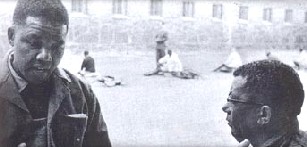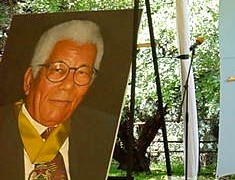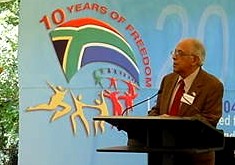History and heritage
Walter Sisulu's Garden
 Mandela and Sisulu,
Robben Island prison yard, 1966.
Mandela and Sisulu,
Robben Island prison yard, 1966.(Photo: UWC-Robben Island Mayibuye Archives) On 11 July 1963 Liliesleaf Farm, the ANC's secret headquarters at the time, was raided by police. Sisulu, Govan Mbeki and others were detained, and Sisulu was held in solitary confinement for 88 days. He was charged in the Rivonia trial in October 1963, and on 12 June 1964 sentenced to life imprisonment for planning acts of sabotage. On the following day Sisulu, Mandela and the other convicted Rivonia trialists were sent to Robben Island. Prisoners had individual cells on Robben Island, but once they were moved to Pollsmoor Prison outside Cape Town in 1985, Kathrada and Sisulu shared a cell for four years. Saturday nights for Sisulu were family nights - he used to spend hours going through his photograph album, slowly turning the pages. Kathrada said Sisulu was "crucial in opening doors that were previously closed". Sisulu was released from prison in 1989, after spending 26 years behind bars. In the foreward to "In Our Lifetime", the recently published biography of Walter and Albertina Sisulu, Nelson Mandela writes: "If we as a liberation movement and a nation were to be given the choice of one life story to be told, that story would have to be Walter Sisulu's. "In his life and the work of his life are captured and demonstrated the best, the noblest, the most heroic, the most deeply humane that our movement and our country represent and seek to represent." Source: City of Johannesburg website
 Walter Sisulu: writ large in South Africa's history
Walter Sisulu: writ large in South Africa's history
 'Sisulu was the father of everyone' ... long-time friend and former prison cell-mate of Walter Sisula, Ahmed Kathrada, speaks at the renaming ceremony
'Sisulu was the father of everyone' ... long-time friend and former prison cell-mate of Walter Sisula, Ahmed Kathrada, speaks at the renaming ceremony
Related links
Related articles
SA struggle biographies
"Our generation is fast disappearing", Nelson Mandela said at the launch of Walter and Albertina Sisulu: In Our Lifetime. But with more and more South African struggle biographies filling the shelves, they are leaving behind a considerable legacy in print.


